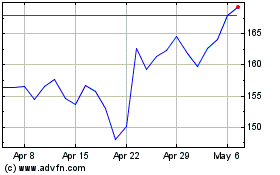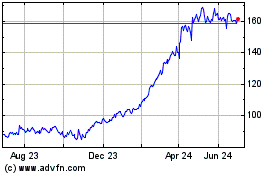Beleaguered GE Hopes Energy Storage Is Its Next Big Business
March 07 2018 - 6:29AM
Dow Jones News
By Erin Ailworth
HOUSTON -- General Electric Co. plans to unveil a new battery
platform Wednesday as it seeks to become a leader in the emerging
market of storing electricity.
GE is set to announce a giant battery platform called GE
Reservoir that can store power generated by wind turbines and solar
panels for later use. It can also be used to add jolts of power
when needed to stabilize voltage and frequency on the electric
grid.
The battery storage market, currently tiny, is expected to grow
considerably in the next decade -- and already features big-name
competitors including Tesla Inc., which deployed an enormous
battery system in Australia last year. Siemens AG paired with AES
Corp. last year to launch Fluence Energy LLC, a joint venture that
is building what is expected to be the world's largest lithium-ion
battery in California.
"Energy storage is like a Swiss Army knife -- there are so many
things you can do with it," Eric Gebhardt, vice president and
strategic technology officer at GE Power, who is scheduled to talk
about batteries at the CERAWeek energy conference here Thursday.
The battery being unveiled -- a 1.2 megawatt unit -- is the first
in a series GE plans to launch under the Reservoir platform.
This isn't GE's first attempt to turn batteries into a big
business. The company tried making battery cells several years ago
but abandoned the effort when it couldn't compete with the dominant
technology, lithium-ion batteries. GE then turned its attention to
selling battery systems via a subsidiary called Current. It
recently revamped that business, creating a stand-alone battery
unit within the GE Power division.
Success would be a needed boost for the struggling conglomerate,
which is in the middle of restructuring and said last week it would
overhaul its board. GE is seeking access to a market that Navigant
Research predicts will generate tens of billions of dollars in
revenue in the next decade or so.
One of GE's biggest challenges will be differentiating its
battery products from those offered by competitors like Fluence.
Mr. Gebhardt said GE will seek to leverage its vast footprint in
electricity to build its battery business.
Battery storage is expected to grow in part because prices have
dropped sharply in recent years, as rechargeable batteries have
become ubiquitous in products such as laptops and smartphones.
Lithium-ion battery packs that cost $1,000 per kilowatt-hour at the
start of the decade now cost between $250 to $300 per
kilowatt-hour, said Ravi Manghani, director of energy storage at
GTM Research.
GTM forecasts that from the end of 2017 through 2023, the amount
of storage connected to the power grid will multiply by more than
25 times. It estimates Fluence is the current market leader.
"There's a lot of excitement and hence we are seeing all these
companies enter the storage space now," Mr. Manghani said. "The
question, of course, is who survives and who doesn't?"
(END) Dow Jones Newswires
March 07, 2018 06:14 ET (11:14 GMT)
Copyright (c) 2018 Dow Jones & Company, Inc.
GE Aerospace (NYSE:GE)
Historical Stock Chart
From Mar 2024 to Apr 2024

GE Aerospace (NYSE:GE)
Historical Stock Chart
From Apr 2023 to Apr 2024
